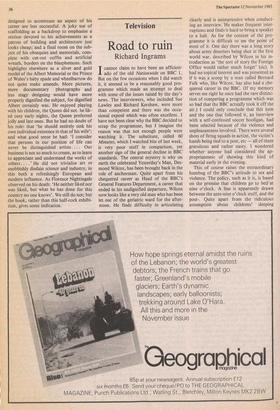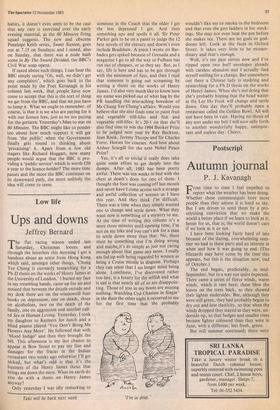Television
Road to ruin
Richard Ingrams
T cannot claim to have been an afficion- 1 ado of the old Nationwide on BBC 1. But on the few occasions when I did watch it, it seemed to be a reasonably good pro- gramme which made an attempt to deal with some of the issues raised by the day's news. The interviewers, who included Sue Lawley and Richard Kershaw, were more than competent and there was the occa- sional expose which was often excellent. I have not been clear why the BBC decided to scrap the programme, but I imagine the reason was that not enough people were watching it. The substitute, called 60 Minutes, which I watched bits of last week, is very poor stuff in comparison, yet another sign of the general decline in BBC standards. The central mystery is why on earth the celebrated Yesterday's Man, Des- mond Wilcox, has been brought back in the role of anchorman. Quite apart from his chequered career as Head of the BBC's General Features Department, a career that ended in his undignified departure, Wilcox now looks like a very old man who has been let, out of the geriatric ward for the after- noon. He finds difficulty in articulating clearly and is unimpressive when conduct- ing an interview. He makes frequent inter- ruptions and finds it hard to bring a speaker to a halt. As for the content of the pro- gramme it is difficult to see the point of most of it. One day there was a long story about army deserters being shot in the first world war, described by Wilcox in his in- troduction as 'the sort of story the Foreign Office would rather much forget' (sic). It had no topical interest and was presented as if it was a scoop by a man called Bernard Falk who, like Wilcox, has also had a che- quered career in the BBC. (If my memory serves me right he once had the rare distinc- tion of compering a programme which was so bad that the BBC actually took it off the air.) I could only conclude that this item and the one that followed it, an interview with a self-confessed soccer hooligan, had been selected because of the violence and unpleasantness involved. There were several shots of firing squads in action, the victim's hands being tied to a post, etc — all of them gratuitous and rather nasty. I wondered whether anyone had considered the ap- propriateness of showing this kind of material early in the evening.
This of course raises the extraordinary humbug of the BBC's attitude to sex and violence. The policy, such as it is, is based on the premise that children go to bed' at nine o'clock. A line is apparently drawn between the ante-nine o'clock stuff, and the post-. Quite apart from the ridiculous assumption about childrens' sleeping
habits, it doesn't even seem to be the case that any care is exercised over the early evening material, as the 60 Minutes firing squad suggests. The new and obscene Penelope Keith series, Sweet Sixteen, goes out at 7.15 on Sundays; and I noted, also on Sunday, that there was a nude bath scene in By The Sword Divided, the BBC's Civil War soap opera.
If taxed about such things, I can hear the BBC simply saying 'Oh, well, we didn't get any complaints', which goes back to the point made by the Poet Kavanagh in his column last week, that people have now come to accept that this is the sort of thing we get from the BBC, and that we just have to lump it. What we ought to remember, of course, is that it is we who are paying for it with our licence fees, just as we are paying for the geriatric Yesterday's Man to star on 60 Minutes. The BBC might like to ponder too about how much support it will get from 'the public' when the Government finally gets round to thinking about 'privatising' it. Apart from a few old stagers like Richard Hoggart, how many people would argue that the BBC is pro- viding a 'public service' which is worth £.50 a year to the licence-holder? The more time passes and the more the BBC continues on its downward path, the more unlikely the idea will come to seem.















































 Previous page
Previous page